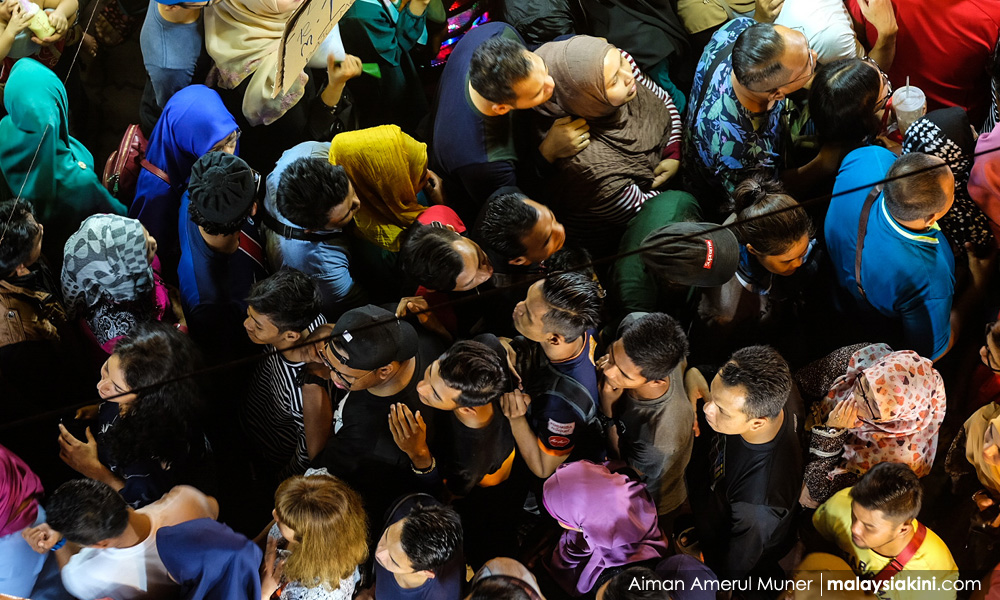
YOURSAY | ‘As long as we practice race-based politics, the pendatang issue will never go away.’
Anonymous 242641505703475: Malaysiakini columnist P Gunasegaram argues that almost all Malaysians are ‘pendatang’ (immigrants) in his article, “I am a pendatang and proud of it”.
The real ‘sons of the soil’ are the Orang Asli, the forgotten people.
And where are they? Still toiling the land to earn a living; still catching fish to put food on the table; still living in remote parts of the nation.
Do we care for them? Or do we only see them every five years when the general election is on?
Awang Top: I am a human being first. I have mixed parentage. My ancestors came to Malaya long before those 'ketuanans' existed. To be exact, 173 years ago. But I am still a pendatang.
My forefathers contributed immensely to the development of east coast states and received numerous awards from sultans. But I am still a pendatang.
My father helped many Malays in businesses and some of them went on to be prominent politicians and millionaires. But I am still a pendatang.
Anonymous #70881335: It is about time to seriously think about this - who is a Malay? It is akin to ask "Who is an American". The issue becomes more of citizenry rather than race.
But, more important now, I think, is to build a "Malaysian" race. How to define this?
Perhaps, a third-generation person of any race or religion in Malaysia should be called a Malaysian, rather than Malay, or Chinese Malaysian or Indian Malaysian or Iban and so on and on.
Hopelessly: Let's face the fact, as long as we practice race-based politics, this issue will never go away, even if Pakatan Harapan manages to somehow win the election miraculously - see who is leading the opposition alliance.
It's not hard to see that the pendatang will always be pendatang, proud or not.
David Dass: It is important to ask why there is this insistence on labelling some Malaysians pendatang. Why try to sectionalise our people in this way?
Our constitutional provisions are quite clear on the subject. All Malaysians are equal under the law and enjoy equal protection of the law.
There is Article 153 which provides special rights for Malays - later extended to cover the natives of Sabah and Sarawak. Article 153 does not cover all Malays. It only covers Malay who were citizens of the country in 1957 and their descendants.
All Malaysians accept that there was a need to help Malays catch up with the others. In any event, these are entrenched provisions. So it is clear that those who come within the class of people contemplated by Article 153 obtain certain benefits not available to the others.
Apart from Article 153, all Malaysians, whatever their race or religion, are equal before the law. So why keep flogging the issue of who were the original people of Malaysia and who were the later migrants?
Is it to galvanise the Malays into a common fold for a specific purpose? If so, to what purpose? Is the strategy such that it requires the Malays to see the non-Malays as a threat to their existence?
That is the language often used by some politicians. Is it good for the country to stoke the fires of racial politics?
The Malays, Chinese and Indians have a long history together. They understand one another well, having so many common experiences. They have little to gain from fighting with one another. Is it an objective of this strategy to drive as many Indians and Chinese away from the country?
If so there has been some success there, as many Chinese and Indians have left the country.
The Chinese were about the same number as the Malays in 1955. They comprised 36 percent of the national population in 1971 and they are now less than 26 percent. The Indians made up 12 percent of the population in 1971 and are now less than 7 percent.
Their numbers are on a decreasing trend. This is not a good thing. The diversity in our country is a source of strength for us. We learn from one another.
Unfortunately, our race-based politics is driving us apart. Gunasegaram's essay serves to help us obtain a perspective on the biggest issue confronting us.
Anonymous 242641505703475: Will all pendatang stand up? Do a head count. So, let not the pot call the kettle black. Using race and religion will hit you like a boomerang.
The wise Malay rulers have spoken out loud and clear. Respect all people of various faiths, cultures and races. All are Malaysians.
Respect the rule of law; and there is only one law for all. No one is above the law; the law is always above all of us. Follow strictly the Rukunegara and the Federal Constitution.
Unity, as the Malay rulers declared is of paramount importance. It is a timely reminder as GE14 approaches. Never use race, religion, hatred, suppression, gerrymandering to make "short-term gains" for political mileage.
Think of the whole nation. This is not a Malay, Chinese, or Indian Malaysia; it is a Malaysian Malaysia.
SusahKes: History belongs to those who drive the narrative. For example, just take a look at our school's history books, and see which topic comprises a significant portion of the syllabus.
Now, again, who controls the narrative of this country?
Anonymous 242641505703475: We cannot afford to have selfish leaders. Sixty years of Independence and yet we are still struggling in the Third World and trying to be in the First. Why, why, why?
We must face the hard truth - mediocrity is not the way forward; meritocracy is the only way forward. Bite the bullet, all ye Malaysians; and rise to the occasion.
Rupert16: Well said, Gunasegaram. You are indeed speaking for all pendatang. Thank you. -Mkini


No comments:
Post a Comment
Note: Only a member of this blog may post a comment.